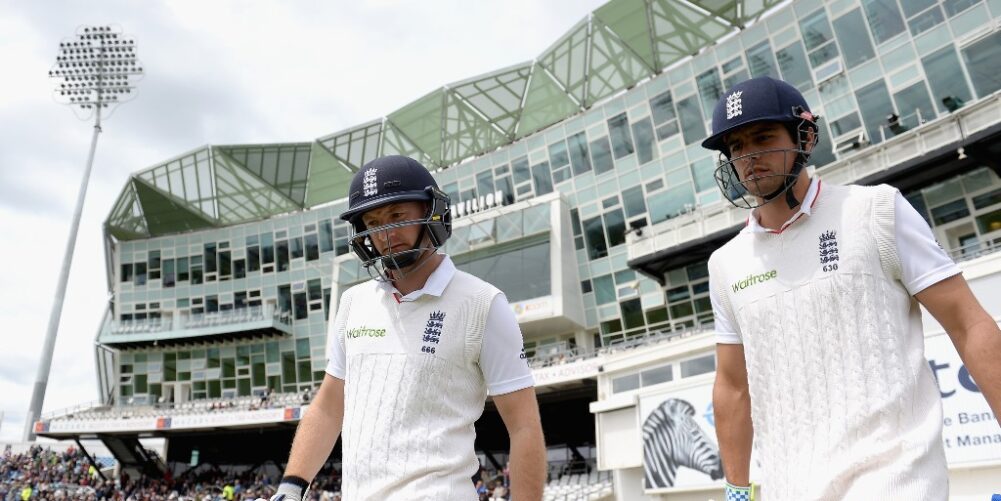(Photo: Getty Images)
We continue our three-part series looking back on Alastair Cook’s Test captaincy, analysing here the trials and tribulations of 2015. An Ashes-winning year which tested Cook from 360 degrees…
By 2015, the penny had dropped that England were facing a one-in one-out door policy when welcoming a fellow opener into the fold.
The penny-jar approach of Jonathan Trott worked great as a no.3, but promoting him to opener midway through Cook’s tenure worked like a contraceptive when what England needed was for life to be given to their top order.
Scoring 72 runs in six innings saw Trott returned to the position he had shown no signs of relinquishing since his Test debut in 2009.
England’s poorly judged experiment heaped pressure on the ECB’s chairman of selectors’ James Whitaker, whose strategy to overcome an ongoing problem seemed to be mainly based on tarot card readings.
Michael Carberry, Sam Robson and Nick Compton were each allowed to live and let die, the former of the trio rather acrimoniously when dropped from the ensuing ODI and T20 matches after England’s 5-0 Ashes whitewash.
What started as a selection problem – one that should have been anticipated given Strauss’ decline in runs – escaped all manner of England’s diligent development programmes and was now the biggest complexity Cook faced.
England’s approach was not one of development but enhancement. A list of suitors to partner Cook was one with too many names on as the ECB scurried to identify their equivalent of New Zealand’s Tom Latham or South Africa’s Dean Elgar.
By the time England touched down on home soil after securing a 1-1 series draw in the Caribbean, Cook must have felt like Henry VIII. As he began preparations for the 2015 home series against New Zealand with a sixth opener, Yorkshire’s Adam Lyth, Cook awaited the fellow left-hander’s berth.
Picked for his county average of 67.78 during the White Roses’ 2014 County Championship triumph, not to mention his impressive stock in trading a century for a score surpassing 150, Lyth seemed the logical step to take in ending the open auction.
The new partnership answered the questions asked by a Kiwi attack fast becoming one of the finest tuned in cricket: Lyth hit a maiden century in the second Test to coincide with Cook surpassing Graham Gooch’s record for most Test runs by an Englishman.
Headingley stood in applause for two England openers as they won the Test to ensure the series concluded in a 1-1 draw. Would this allow them to focus on the other crux of replacing the retired Graeme Swann?
No. Lyth played nine more innings before being dropped from the set-up as he stumbled to an average tipping just over 20. His off-stump weakness projecting the vulnerable state of England’s top order when targeted by the Australians in the Ashes series that would follow later that summer.
Despite the dubious and mishandled departure of coach Peter Moores at a point as significant as the lead up to an Ashes series, England’s will to reclaim the urn provided one of many acclaims during Cook’s reign.
At 1-1 in the series after two Tests, England’s impressive record at both Edgbaston and Trent Bridge gave Cook and co. the security to take an unassailable 3-1 lead heading into the fifth and final match at the Oval.
Life as captain for Cook was a personal stranglehold but it was not without its glories.
Under the new direction of coach Trevor Bayliss, Cook was “urged to be positive in his captaincy. He has changed.” Kevin Pietersen wrote in the wake of the 3-2 Ashes victory, usually a voice of critical demeanour after previous inner camp politics.
“Even when he talks in post-match interviews, he appears relaxed and not worried about what he says instead of being defensive,” Pietersen conceded.
Trusted by the ECB, the Essex opener was able to witness the marvelled performances of vice-captain Joe Root, as well as the worriless personality of Mark Wood who added humour to the side’s XI.
But as tours to Abu Dhabi and South Africa approached, the opening batsman dilemma still rankled with Cook, who admitted ““It is a concern. I don’t think we have quite found it. When we were No 1 in the world we had a really solid, settled batting line-up, but we are in transition at the moment.”
The inclusions of recent openers Ben Duckett, Haseeb Hammeed, and Keaton Jennings show that England have yet to finalise their preferred no 2 after selecting eleven candidates to succeed Strauss.
The upside is Hameed challenged an India attack which otherwise got the better of England’s batsmen.
But this shouldn’t detract from the selectors’ and individual failings which provided Cook with an issue not uncommon to prior captains, but in this case uncommon in its length.
Now free from handling a captain’s responsibilities perhaps Cook can view mentoring 20-year-old Hameed as his parting gift for when he retires.












